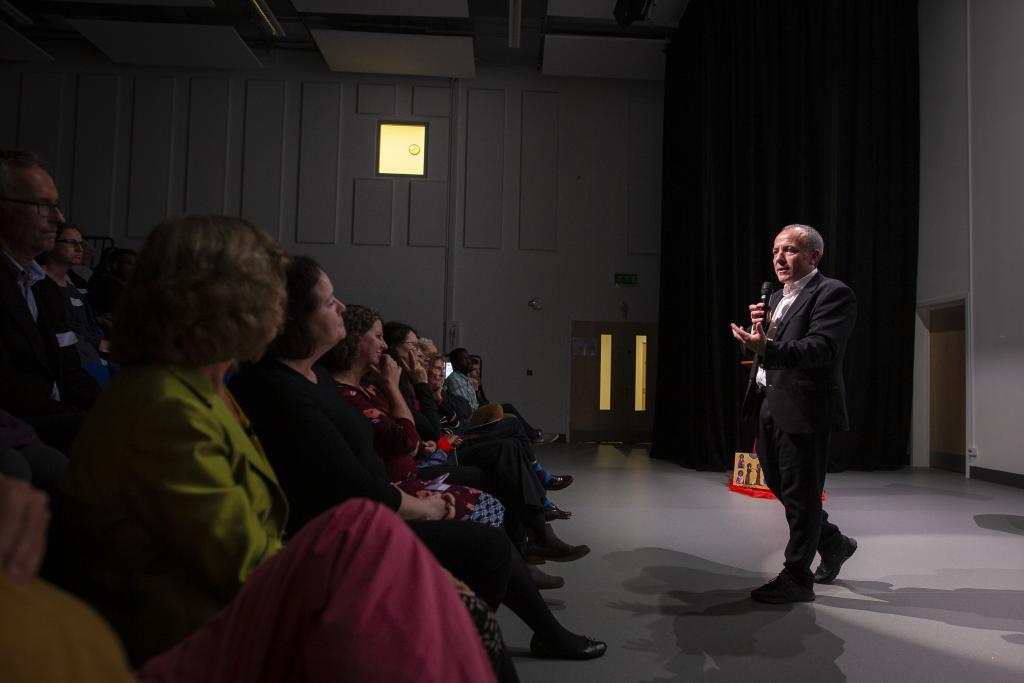On Tuesday 8th October 2019, Maria Fidelis Catholic School welcomed Mike Kane MP, Shadow Minister for Schools, to deliver an evening lecture on the topic of, ‘Faith, Politics and Power: The Catholic effect in public life’. The evening was organised by Catholic People’s Weeks (CPW) and marked the group’s inaugural autumn lecture. The event was sponsored by CCLA.
Helen Gill, Headteacher of Maria Fidelis Catholic School, welcomed those gathered with an introduction to Maria Fidelis, a co-educational, inner city secondary school located in the Somers Town ward of Camden. There are 78 languages spoken, 49 nationalities represented and multiple faith traditions can be identified. ‘In this diversity, we are a typical Catholic school’, said Helen.
Recalling Pope’s Francis’ encouragement for religious leaders to ‘smell like the sheep’, Helen remarked that it is impossible not to be affected by the issues facing the local community. Knife crime and drug dealing are a reality in Camden, and, like Pope Francis, she believes that the Catholic Church has a special mission in areas like this.
Helen spoke with confidence about Mike Kane’s commitment to Catholic education. She had recently learned that they shared the experience of being educated by the Loreto Sisters and that Mike was formerly a teacher himself. Helen praised Mike for openly occupying the public space as a person of faith. She concluded by sharing her belief that the Catholic faith is one of the great engines of social justice.
Mike Kane began his lecture by acknowledging that he would not be where he is today without the Catholic education he received. He then moved to the central issue of power, admitting that politics is often about the exercise of power but that people of faith have a framework within which to engage it. Quoting Karl Rahner’s assertion that, ‘Power is a gift from God’, Mike suggested that we all have some power, however small, and it is our duty to grow it and apply it to bring about goodness. He distinguished between coercive power (power over others) and relational power (power shared with others).
Mike then set out how he saw the Church as being primarily visible in the world through liturgical practice, sacramental presence and social action as outlined in Catholic social teaching (CST). In his role as an MP, Mike explained how Catholic social teaching provides him with three distinct lenses through which he views his parliamentary responsibilities. These are human dignity, solidarity and subsidiarity.
He acknowledged that recent parliamentary sessions have not always been a masterclass in MPs displaying mutual respect for the human dignity of one another. However, as a silver lining, he also noted how the high-stakes political drama is increasing public engagement and interest in politics. He suggested that the dignity of each person can be interpreted in two ways: the first, from Genesis, is that all of us are created equal. The second is about flourishing and reflects John 10:10, that we may have life to the full, in abundance.
Quoting the Jewish Philosopher Martin Buber, who, when challenged as to the whereabouts of God, stated that God was in the ‘spaces between people’, Mike described the strengthening effect of solidarity. One person with little power acting alone can have little effect, many people with little power working together can change hearts and minds. God’s presence in the spaces between them is a powerful one.
Mike defined subsidiarity as giving people the power and agency to make decisions to bring about the changes which will impact them. He reminded the audience that the lecture was being delivered in a week when Extinction Rebellion was making its presence and protest felt on the streets of major cities, including London. Mike suggested that the Church continues to speak and display subsidiarity through the teachings in Laudato Si and the Amazon Synod taking place in October 2019.
Mike explained how placing his decision-making within the context of these three principles has provided him with a framework for his political life where he can be true to what the Church calls, ‘The Corporal works of Mercy’. Finally, quoting the American cultural anthropologist Margaret Mead, he encouraged the audience to ‘never doubt that a small group of like-minded committed people can change the world’ and reminded them that social action is one of the most effective ways to draw people to faith.
‘So go out there’, he said, ‘and change the world!’
After he had delivered the lecture, Mike Kane answered questions from the audience. The Q and A session was facilitated by Janet Emmanuel, Assistant Headteacher at Sydenham School in South London. Mike addressed a varied number of questions and issues, including whether Jesus was a socialist, the interpretation of Catholic social teaching through a Conservative viewpoint, the sanctity of life and climate change.
Following the Q and A, the conversation continued informally in the drama studio where attendees were also able to view the exhibition, ‘Sink or Swim - Catholicism in Sixties Britain through John Ryan’s cartoons’, co-curated by Isabel Ryan and Dr Alana Harris. The following day the exhibition curators delivered a talk to the Year 13 students at Maria Fidelis Catholic School.
Details of future CPW events are available here.
Published: 25th October 2019




